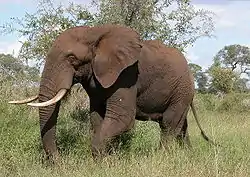elefante
Asturian
Etymology
Borrowed from Latin elephantem, accusative of elephans, from Ancient Greek ἐλέφᾱς (eléphās). Cognates include Spanish elefante and Portuguese elefante.
Pronunciation
- IPA(key): /eleˈfante/, [e.leˈfãn̪.t̪e]
- Rhymes: -ante
- Hyphenation: e‧le‧fan‧te
Basque
Etymology
(This etymology is missing or incomplete. Please add to it, or discuss it at the Etymology scriptorium. Particularly: “From Spanish or directly from Latin?”)
Pronunciation
- IPA(key): /elefante/, [e̞.le̞.fãn̪.t̪e̞]
Audio (file)
Declension
| indefinite | singular | plural | |
|---|---|---|---|
| absolutive | elefante | elefantea | elefanteak |
| ergative | elefantek | elefanteak | elefanteek |
| dative | elefanteri | elefanteari | elefanteei |
| genitive | elefanteren | elefantearen | elefanteen |
| comitative | elefanterekin | elefantearekin | elefanteekin |
| causative | elefanterengatik | elefantearengatik | elefanteengatik |
| benefactive | elefanterentzat | elefantearentzat | elefanteentzat |
| instrumental | elefantez | elefanteaz | elefanteez |
| inessive | elefanterengan | elefantearengan | elefanteengan |
| locative | — | — | — |
| allative | elefanterengana | elefantearengana | elefanteengana |
| terminative | elefanterenganaino | elefantearenganaino | elefanteenganaino |
| directive | elefanterenganantz | elefantearenganantz | elefanteenganantz |
| destinative | elefanterenganako | elefantearenganako | elefanteenganako |
| ablative | elefanterengandik | elefantearengandik | elefanteengandik |
| partitive | elefanterik | — | — |
| prolative | elefantetzat | — | — |
Classical Nahuatl
Alternative forms
- elepante (obsolete)
Corsican

Alternative forms
Etymology
Borrowed from Latin elephantem, accusative of elephas, from Ancient Greek ἐλέφᾱς (eléphās). Cognates include Italian elefante and Spanish elefante.
Pronunciation
- IPA(key): /eleˈfãnte/
References
- “elefante, elefente” in INFCOR: Banca di dati di a lingua corsa
Galician
Alternative forms
- alefante
Etymology
Attested since the 14th century. From Old Galician-Portuguese [Term?], borrowed from Latin elephās, elephantis (“elephant”), from Ancient Greek ἐλέφᾱς (eléphās, “elephant, ivory”).
Pronunciation
- IPA(key): /ɛleˈfante̝/
References
- “elifante” in Dicionario de Dicionarios do galego medieval, SLI - ILGA 2006–2022.
- “elefante” in Xavier Varela Barreiro & Xavier Gómez Guinovart: Corpus Xelmírez - Corpus lingüístico da Galicia medieval. SLI / Grupo TALG / ILG, 2006–2018.
- “alyfante” in Xavier Varela Barreiro & Xavier Gómez Guinovart: Corpus Xelmírez - Corpus lingüístico da Galicia medieval. SLI / Grupo TALG / ILG, 2006–2018.
- “elefante” in Dicionario de Dicionarios da lingua galega, SLI - ILGA 2006–2013.
- “elefante” in Tesouro informatizado da lingua galega. Santiago: ILG.
- “elefante” in Álvarez, Rosario (coord.): Tesouro do léxico patrimonial galego e portugués, Santiago de Compostela: Instituto da Lingua Galega.
Italian
Etymology
Borrowed from Latin elephantem.
Pronunciation
- IPA(key): /e.leˈfan.te/
- Rhymes: -ante
- Hyphenation: e‧le‧fàn‧te
Audio (file)
Derived terms
Descendants
- → Sicilian: lifanti (or inherited from Latin)
References
- elefante in Treccani.it – Vocabolario Treccani on line, Istituto dell'Enciclopedia Italiana
Further reading
 elefante on the Italian Wikipedia.Wikipedia it
elefante on the Italian Wikipedia.Wikipedia it
Latin
Portuguese

Alternative forms
- elephante, elephãte (obsolete)
Etymology
From Old Galician-Portuguese (h)elefante, elifante, borrowed from Latin elephantis (“elephant”), from Ancient Greek ἐλέφᾱς (eléphās, “elephant, ivory”).
Pronunciation
- (Brazil) IPA(key): /e.leˈfɐ̃.t͡ʃi/
- (Southern Brazil) IPA(key): /e.leˈfɐ̃.te/
- (Portugal) IPA(key): /i.lɨˈfɐ̃.tɨ/
- Rhymes: (Portugal) -ɐ̃tɨ, (Brazil) -ɐ̃tʃi
- Hyphenation: e‧le‧fan‧te
Derived terms
Related terms
Descendants
- Papiamentu: elefante
Spanish
Etymology
From various Old Spanish forms like elifant, alefant and eleofant, all ultimately from Latin elephantis, from Ancient Greek ἐλέφας (eléphas).
Pronunciation
- IPA(key): /eleˈfante/ [e.leˈfãn̪.t̪e]
Audio (Colonbia): (file) - Rhymes: -ante
- Syllabification: e‧le‧fan‧te
Derived terms
Descendants
Further reading
- “elefante”, in Diccionario de la lengua española, Vigésima tercera edición, Real Academia Española, 2014